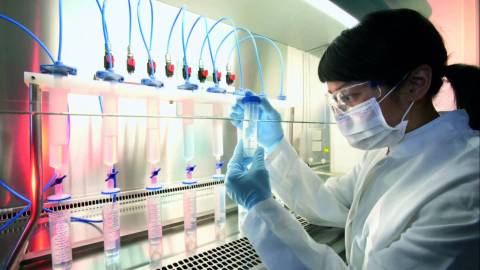Should You Get a Genetic Test?

If an expert could tell you when you were going to die and what of, would you want to know? Genetic testing isn’t there, yet. Someday, it might tell you your chances of a laundry list of conditions such as heart disease, diabetes, Alzheimer’s, and much more. Today, there are more than 1,000 such tests already in use, which scan chromosomes, DNA, genes, and proteins, for biomarkers tipping off one’s propensity for certain conditions.
Most tests are doctor-driven, to help diagnose a condition, test a newborn for problems that can inhibit development, or to find out how well a patient will respond to a certain drug. Researchers also use such testing to discover the genetic forces behind certain diseases, to help understand body tissues and processes, and even how certain pathogens operate.
Today, there are two main focuses when it comes to patient-driven testing, pregnant women who want to see their child’s likelihood of a certain hereditary disease, and adults who want to find out what their chances of cancer are. For expectant parents, genetic testing is sometimes called “carrier testing.” This is scanning for “recessive disorders.” Here, both parents must carry a gene for a certain disease, for their child to have a chance at developing it. If they do, the chances are 25%.
For this kind, a woman’s ob-gyn will perform the screening via a blood test. The woman is tested before her partner since she is generally under the care of a physician at this time. Results come back in two weeks. If nothing is wrong, there is no need to test her partner.

Genetic testing a newborn.
Experts say the ideal time to get tested is when a couple is trying to get pregnant. If there is a high risk of the baby having a certain condition, the couple can opt for things like sperm or egg donation, or even adoption. It may make sense when pregnancy has not been planned. A woman and her partner can read up on the condition the fetus is predisposed to and prepare themselves. Moreover, a genetic test can let the doctor know what sorts of prenatal tests should be performed, such as CVS (chorionic villi sampling) or amniocentesis.
Ethnic or racial background increases the likelihood of a child inheriting a certain condition. African-Americans, Southeast Asians, and those of Mediterranean descent for instance, are more likely to face thalassemia, a condition much like sickle cell anemia. Another example, Caucasians and Easter European Jews have a higher risk of cystic fibrosis. A certain family history is usually what makes the need for genetic testing significant.
As for testing for the likelihood of cancer, there are particular mutations which can signify a higher risk of breast, prostate, thyroid, ovarian, colon, and other types. Such a screening will not only tell you whether or not you have a higher risk, but if you will pass this mutation on to your children. It can also let you know whether or not you should be extra vigilant with screening, and to take steps to further lower risk.

Genetic testing.
Even so, today no genetic test can give you certainty. It can merely tell you whether or not you have a higher risk than the average person. Those who have a certain gene mutation for instance may be told that they have a 75% risk of breast cancer. Still, they may never get it. Conversely, a woman with a 25% risk could end up developing cancer. Certain mutations only mean one’s risk is higher. That said, those women who carry the gene mutations BRCA1, BRCA2, and PALB2 have a higher risk of breast and/or ovarian cancer. A recent study has also implicated BRCA1 in prostate cancer cases.
Certain hereditary factors themselves increase risk. If a person has had three or more close relatives who had a certain kind of cancer, all on the same side of the family, they have an increased risk. If two or more relatives developed cancer at an early age, the risk is higher. If two or more kinds of cancer developed within the same close relative, it becomes more likely as well.
A genetic test can be performed using a blood, urine, or amniotic fluid, with hair or cheek cells—taken from a mouth swab. Counseling should take place before and after testing. It is not recommended that children under age 18 are tested. Those adults who are not mentally prepared may want to avoid it as well. Some upon hearing that they have a higher risk of cancer wrestle with anxiety, guilt, or depression. There are those who make themselves sick with worry, even though they may never actually develop the disease. Some people even feel guilty if say their family member carries a certain mutation which they themselves don’t have. A person may also feel compelled to share their test results, which could create tension in the family.

This chart calculates the chances of having Huntington’s disease, a hereditary condition.
On another front, some clinicians believe that certain people can also be lulled into a false sense of security. Remember that if you get a negative result, it only means your risk is average. Medical history, lifestyle, and environmental factors play a significant role as well. Other problems, sometimes, genetic tests will even give unclear results. Or the person may have a certain kind of mutation the test cannot detect. Another drawback is the high cost. Genetic testing can run between $100 and $2,000 or more. In some instances, the insurance company will pay for some, but not all of it.
What’s more, there are a lot of companies that are making tremendous claims with direct-to-consumer (DTC) or personal genetic tests. Whether they deliver is another matter. Some have gotten in trouble for less than desirable business practices. Renaissance RX for instance is being investigated by Justice Dept. for billing and payment practices. The FDA started regulating such testing in 2010. A company called 23andMe recently were threatened with actions by the agency “…not limited to, seizure, injunction, and civil money penalties” for continuously ignoring requests. Though more expensive, it may be better to do such testing under the supervision of a trusted medical professional.
Lastly, for those who have privacy concerns or fear discrimination, rest assured that The Genetic Information Nondiscrimination Act (GINA), protects against employer or health coverage discrimination, based on genetic information.
To learn more about click here:





